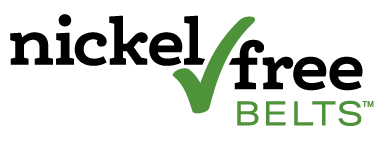Nickel Allergy and Nickel Free Diets
While the effects of nickel allergy are fairly widely known to those that suffer from it, one area of nickel allergy is less widely recognized: Dietary nickel allergy.
If someone is sensitive to nickel they know to use products that are nickel free (such as our nickel free belts). But a growing problem in today’s health conscious society is the ingestion of foods that are heavy in nickel. The very foods we are told are good for us tend to have higher concentrations of nickel. Nickel that is ingested builds up over time, until it reaches a level that can trigger a systemic reaction. The most common side-effect is an itching, over-all rash that tends to concentrate around the outside of elbows and palms of hands. Some medical experts suspect that the concentrations build up in thicker skin where there is less blood flow. So what foods should you avoid if you have nickel allergy? Here is a partial list:
On the list of “high” for nickel content:
Legumes, whole grains, and nuts are big culprits. And these are often the things we are told to eat more of to be “healthy”! Cocoa, chocolate, coffee, and tea are high in nickel (sorry!). Green tea is worse than black tea by a considerable amount. Soy products (do you drink a lot of soy milk?), and some vitamin supplements contain high amounts of nickel.
On the list of “moderate” are a few more favorites:
Red wine and beer (sorry again!). Tuna (watch that sushi!), mackerel, tomatoes, onions, and raw carrots, garlic, and spinach.
One overlooked source of ingested nickel can come from canned foods, where nickel is drawn into the food product from the can. Another is from cooking food in stainless steel pots (remember, stainless-steel DOES contain nickel!). While cooking in general is ok, cooking acidic foods (like tomato sauce) can draw in considerable amounts of nickel. Also, it is recommended that if you drink water, or use water for cooking, that you let it run a few minutes to clear out any built up metals in the water.
If you suspect dietary nickel dermatitis (or, as some people with nickel allergy have found, you have symptoms that are very similar to the symptoms from auto-immune disorders, such as fibromyalgia) see your doctor. Besides a low nickel diet, he/she may prescribe a drug called “Antabuse”. Antabuse is used to treat alcoholism, and is sometimes prescribed due to its ability to draw nickel out of the body.
So living completely nickel free may not be as easy as simply buying a nickel free belt, but at least there is something you can investigate if you are suffering from strange symptoms of fatigue, have itching, scaly skin, or severe rashes on your hands and elbows! It may just be your nickel allergy talking to you ;).
Originally published by Janice Enright on March 27, 2014.
